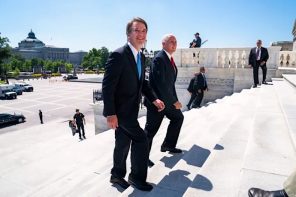Wheaton College grabbed headlines last week for its decision to end student health insurance rather than comply with the contraceptive mandate in the Affordable Care Act. And by comply, I mean: tell the government that it refuses to provide contraception so it can instruct the evangelical school’s health insurer to do so.
According to Wheaton, even notifying the government that it refuses to provide contraceptives would still violate its religious beliefs (although, as I have written before, evangelical opposition to contraception is quite different from Roman Catholic opposition). Wheaton, however, claims it has been put in the untenable position of either violating its conscience or canceling its health insurance.
“What has brought us here is about student health insurance, but it’s bigger than student health insurance,” Paul Chelsen, the school’s VP of student development said at a student information session reported in the Chicago Tribune. “What really breaks my heart is that there are real people that are affected by our decision. But if we don’t win this case, the implications down the road in terms of what the government will tell us what we can and cannot do will be potentially more significant.”
This plays into the idea advanced by the Becket Fund for Religious Liberty, which is representing Wheaton, that faith-based groups will be “forced” to stop providing valuable services to protect their consciences. Becket attorney Mark Rienzi told Reuters that the government is “stopping Wheaton from offering the insurance it used to offer.”
But Wheaton’s move raises questions about just who is being victimized here. After all, the locus of objections to the contraceptive mandate by faith-based employers has been the provision of contraception to employees. While students are part of the picture, the reality is that only a small fraction of students at private, four-year colleges get their insurance through their schools. Most are still on their parent’s health plans, thanks to the Affordable Care Act, which allows young adults to stay on their parents’ plans until they are 26.
According to Reuters, only about 500 of 3,000 Wheaton students are on the school’s student insurance plan, which was only started a few years ago. That’s about 16 percent of the student body. It seems that if Wheaton really wanted to make a principled statement about its inability to comply with the mandate, it would cancel coverage for its employees. But that would create some real blowback for the school and serious legal challenges, both because employers with more than 50 employees are required to provide insurance under the ACA and because the school is most likely contractually obligated to provide health insurance for many of its professors.
So Wheaton is going after the soft target—500 or so undergrads, many of them foreign students, according to the Chicago Tribune—to bolster its contention that it’s being bullied by the government. With federal appeals court after federal appeals court having turned down similar religious liberty claims by Wheaton and other faith-based schools, it seems that sacrificing these students to the gods of hyperbole is their last shot.




